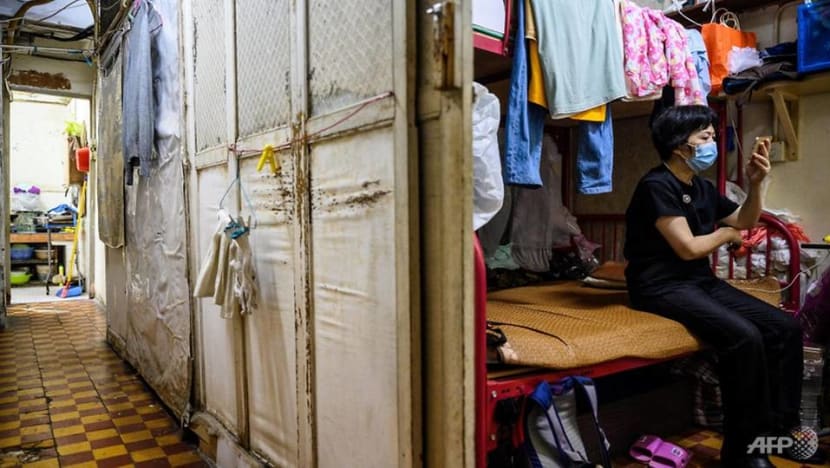Commentary: Hong Kong's renaming of shoebox homes does nothing to mask its inequality crisis
Hong Kong’s cage homes and subdivided flats are the most depressing signs of poverty and inequality spreading across the city, says former SCMP editor-in-chief Wang Xiangwei.

File photo of a walk-up flat that has been subdivided into six cubicles in the New Territories of Hong Kong. (File photo: AFP/Anthony Wallace)

This audio is generated by an AI tool.
HONG KONG: In 1993, I relocated to Hong Kong, where I began my 30-plus-year journey as a journalist, chronicling the ups and downs of what was widely regarded as one of the most dynamic cities in the world.
Shortly thereafter, however, I was shocked to read about “cage homes", where elderly retirees and the working poor slept on bunk beds surrounded by wire cages, presumably to protect their meagre belongings.
It was not uncommon for several dozen downtrodden residents to be crammed into a flat measuring between 400 sq ft and 500 sq ft, often sharing a single toilet, according to media reports at the time.
For many observers, the cage homes were the most glaring sign that Hong Kong was also one of the most unequal places in the world - a dubious honour that the city’s political and business elites had tried to avoid mentioning in public: Out of sight, out of mind.
Three decades later, the appalling living conditions of Hong Kong’s poorest residents have hardly improved. While there may be fewer cage homes now (an estimated 5,000 “cage” lodgers, down from 53,200 in 2007), about 215,000 of Hong Kong’s 7.4 million people live in so-called subdivided flats, colloquially known as "shoebox-sized homes".
These offer tiny rooms made up of purpose-built plywood cubicles, each with its own door.
A CHEERFUL NAME WON’T TACKLE THE REAL ISSUE
In an annual policy address in October, Hong Kong Chief Executive John Lee announced that his administration had finally decided to tackle the scourge that has plagued the city for decades, after establishing a high-level government task force to investigate the issue over the previous 10 months.
Borrowing from a typical political playbook for addressing a hot-button issue, the government first decided to change the designation from subdivided units (SDUs), which have long evoked a negative connotation, to the more cheerfully named basic housing units (BHUs).
A new law will be passed to ensure that each BHU must have a minimum area of 8 sq m, one window and one toilet. To put this into context, this figure is only slightly larger than the average 7 sq m allocated to inmates at the city’s maximum-security prisons.
The authorities arrived at the magic number of eight partly because estimates indicate that only 30 per cent of more than 100,000 SDUs would fail to meet the minimum requirements and would need major renovations to comply.
Secretary for Housing Winnie Ho stated in a recent interview that she once considered raising the minimum size to 10 sq m but abandoned the idea upon realising that this would render over half of the SDUs unsuitable, potentially causing panic among current residents.
The renewed determination to tackle this issue is a step in the right direction, even if it comes several decades late and the plan is, to say the least, unambitious and timid.
DISCONTENT OVER GROWING WEALTH INEQUALITY
Two main underlying reasons have spurred the government into action. Widespread discontent over the growing wealth inequality - epitomised by sky-high property prices and the prevalence of cage homes and other SDUs - is widely believed to have contributed to the violent protests in 2019, which were met with even tighter control from China, including the imposition of the national security law in 2020.
In his latest policy address, Mr Lee acknowledged that the city’s housing affordability crisis was “an issue of great public concern”.
Ironically, direct pressure from Beijing seems to have finally jolted Hong Kong into action. Over the past few years, China’s top leaders, including President Xi Jinping, have repeatedly urged the city to focus on improving people’s livelihoods, including addressing its housing crisis.
In 2021, Xia Baolong, China's top official in charge of Hong Kong, publicly challenged the city to eliminate cage homes and subdivided flats by 2049. If such a call were made on the Chinese mainland, local officials would have quickly jumped into action and rolled out a comprehensive plan, complete with a target ahead of the suggested deadline.
Alas, for those Hong Kong officials who now look to Beijing for guidance, it took them more than three years to develop such an unambitious plan to rename and improve existing subdivided flats.
For many of Hong Kong’s officials, the prevalence of disgraceful cage homes and subdivided flats is still largely viewed as a housing issue. The truth is that they are the most depressing signs of poverty and inequality spreading across Hong Kong.
A report released by Oxfam Hong Kong in October revealed that more than 1.39 million people were living in poverty in the first quarter, a rate of 20.2 per cent, with the poorest 10 per cent of households surviving on roughly HK$1,600 (US$205) a month. In contrast, the city’s richest households earned 82 times more money, compared with 34 times in 2019.
Hong Kong must be bold in tackling poverty and inequality head-on. On this, Mr Lee can learn directly from Beijing.
In 2015, when Mr Xi vowed to eradicate absolute poverty by the end of 2020, about 70 million people lived below the poverty line. He took personal charge, adopted a whole-of-government approach, and developed a holistic plan. Eight years later, in 2021, Mr Xi declared a “complete victory”, saying nearly 100 million people had been lifted out of poverty.
Wang Xiangwei is a former Editor-In-Chief of South China Morning Post. He now teaches journalism at Hong Kong Baptist University.

















